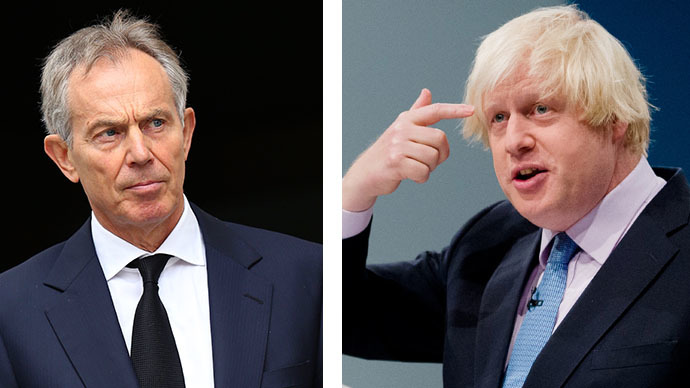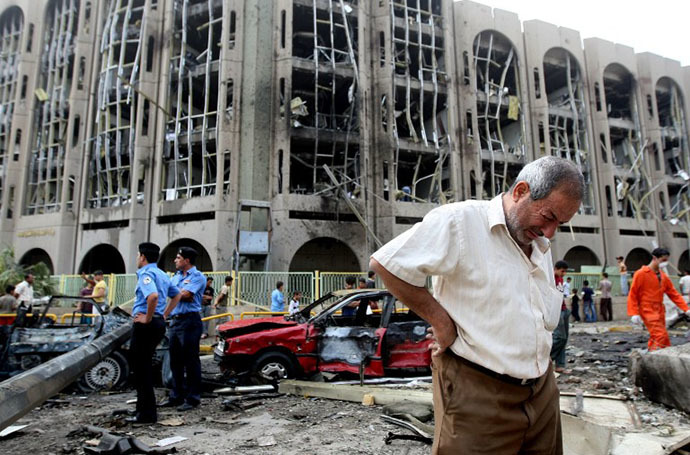‘Blair has finally gone mad’: London mayor ridicules ex-PM over Iraq

Tony Blair’s essay on how the Middle East should blame its own religious dynamics for its troubles – instead of Western attempts at intervention - has seen London Mayor Boris Johnson launch a scathing attack on the “unhinged” former PM.
Johnson’s strong condemnation is a reaction to the arguments made in the former British Prime Minister’s piece entitled 'Iraq, Syria and the Middle East,' where claims range from placing blame on the Shiite government in Iraq to the inherent religious dynamics within the Middle East region, even to Syria for allowing the recent attack on Mosul to take place from within its borders, as well as Shiite fighters from Iran – all to explain why militants from the Islamic State of Iraq and the Levant (ISIL/ISIS) are making such progress these days.
But perhaps the most off-the-wall remark that has sent everyone, from the British press to Blair’s former party mates, to Boris Johnson, over the edge was Blair’s claim that Britain should be thanked, not blamed, for the 2003 invasion of Iraq.
Lashing out at the former Prime Minister, Johnson wrote for The Telegraph on Sunday that “I have come to the conclusion that Tony Blair has finally gone mad.”
His essay “struck me as unhinged in its refusal to face facts. In discussing the disaster of modern Iraq he made assertions that are so jaw-droppingly and breathtakingly at variance with reality that he surely needs professional psychiatric help.”
Attacking also the former PM’s vague claim that Islam should act more responsibly in watching out for both Shia and Sunni extremism on its fringes (since extremism, allegedly, arises out of thin air), Johnson writes: “He said that the allied invasion of 2003 was in no way responsible for the present nightmare – in which Al-Qaeda has taken control of a huge chunk of the country and is beheading and torturing Shias, women, Christians and anyone else who falls foul of its ghastly medieval agenda. Tony Blair now believes that all this was ‘always, repeat always’ going to happen.”
Not so, Johnson believes.

“The reality is that before the US-led invasion of Iraq in 2003, there was no Al-Qaeda presence in that country, none at all.” Despite his brutal tyranny, “Saddam did not have anything to do with the 9/11 attack and he did not possess Weapons of Mass Destruction.”
Hammering the point home about just what exactly British and American interventionism accomplished in Iraq, Johnson lays it out simply, “The truth is that we destroyed the institutions of authority in Iraq without having the foggiest idea what would come next. As one senior British general has put it to me, ‘we snipped the spinal cord’ without any plan to replace it. There are more than 100,000 dead Iraqis who would be alive today if we had not gone in and created the conditions for such a conflict, to say nothing of the troops from America, Britain and other countries who have lost their lives in the shambles.”
The London mayor makes the admission that he was among those that voted for the war in the belief that it was the right thing to do – after all, Saddam was considered a madman whose prolonged rule would only bring about a further stagnation in Iraq. But because there was no government waiting to replace him, as well as no institutions or infrastructure set up in place for after the devastation of the conflict, Johnson, like others, became disillusioned with the Bush/Blair plans.
By refusing to admit the colossal miscalculations and lack of foresight that led to Iraq’s present state a decade after invasion, “Blair is now undermining the very cause he advocates – the possibility of serious and effective intervention.”

“Yes, we helped cause the disaster in Iraq; but that does not mean we are incapable of trying to make some amends. It might be that there are specific and targeted things we could do – and, morally, perhaps should do – to help protect the people of Iraq from terrorism (to say nothing of Syria, where 100,000 people have died in the past three years),” Johnson wrote of Iraq's neighbor, whom Blair accused of being guilty of leading his country into a war with extremist insurgents, while also accusing the West of not doing more to topple the president – the Alawite Bashar Assad, who has been fighting the same Sunni extremism plaguing Iraq for three years now.
Johnson asserts that unless Britain, with its great military spending and permanent seat on the UN Security Council, does not admit to its failures as well as enjoy its successes, it would be completely self-defeating for what it tries to accomplish.
When it comes to the question of why the Iraq invasion happened in the first place, the London mayor alleges that the former British leader’s whole campaign arose out of a desire to achieve personal “grandeur.”
“Somebody needs to get on to Tony Blair and tell him to put a sock in it – or at least to accept the reality of the disaster he helped to engender. Then he might be worth hearing. The truth shall set you free, Tony.”
Boris Johnson traveled to Iraq and wrote his own piece for The Spectator in May 2003, giving his thoughts on life in Iraq after Saddam Hussein.
He reminisced about how "within the space of the last half-hour, I had slunk past a ten-year-old with an AK47 over his shoulder, chewing the fat with his dad in the door of the shop" to the harrowing theme of gunfire, and his tragic near-death experience "in a city with no recognized authority" after accidentally interfering with its shopkeeper.
"It was troubling that we were preparing war against a sovereign country that had, so far, done us no direct harm," Johnson wrote. Despite this, he stated that the disorder was rampant and it wasn't solely at the direct hands of the US but the subsequent post-invasion turmoil.
"Weeks after the invasion, buildings are still burning, not from missiles but from the looting. Most of the shops are shut. There is glass everywhere, and rubbish all over the streets, because there are no municipal services; and there are no municipal services because civic order has broken down," Johnson wrote, citing the concerns of one Iraqi emphatically questioning: "Where is our gas, our electricity? They just make promises!"
"Power is being contested on every corner, between Shia moderates and extremists. It is being fought for by umpteen Kurdish parties, Assyrian parties, secular parties," he added.













